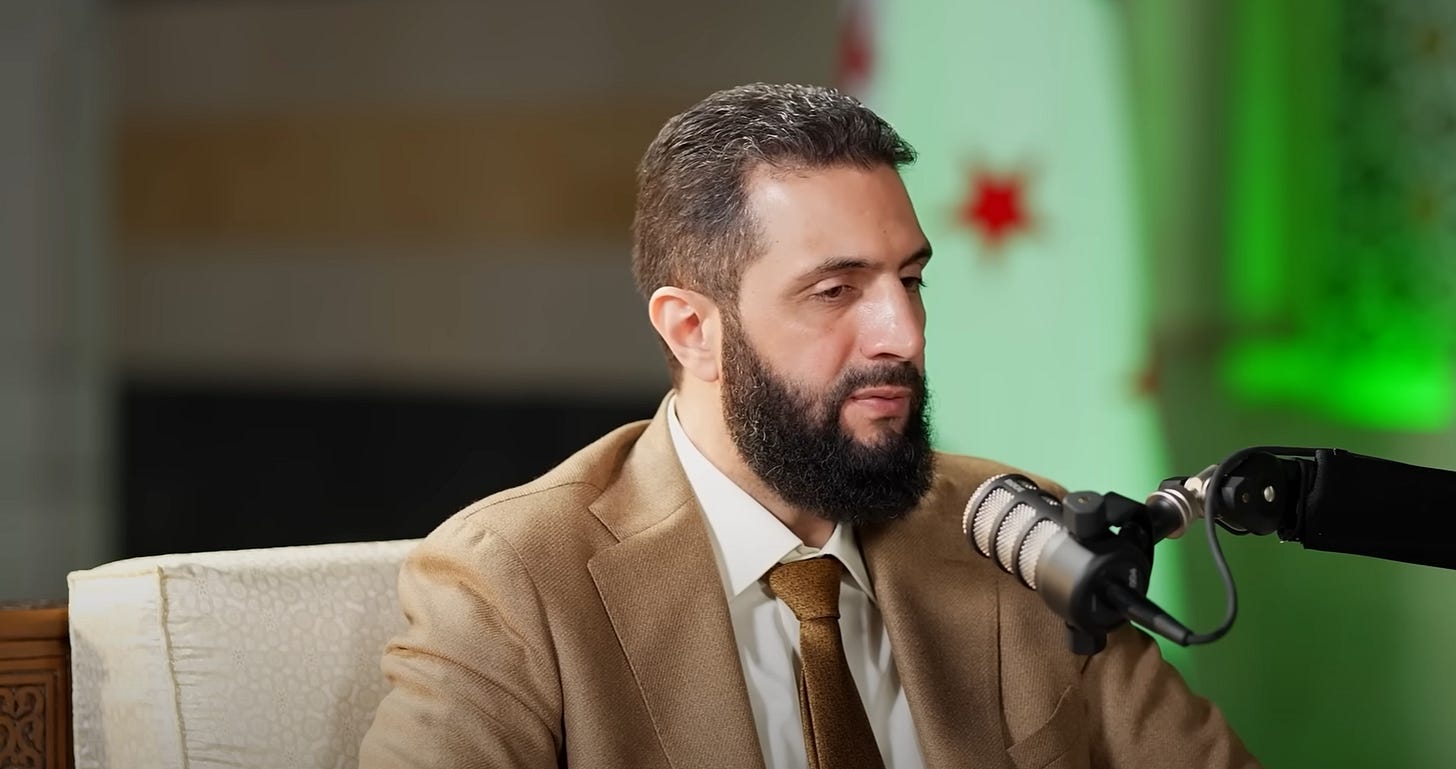Ahmed Al Sharaa’s rise to power in Syria is a rare case in modern history.
His “terrorist résumé” is quite impressive and I’d invite you to have a look at it yourself. Former Al-Qaeda fighter in Iraq, founder of Al Nusra Front, leader of Hayat Tahrir al-Sham (HTS)… and in between lots of dramas.
Now he is the president of Syria… his transformation is nothing short of extraordinary.
I sat to watch his recent interview, finally.

And I found the scenery, context, questions and answers fascinating.
He presents himself as a pragmatic leader, a man forged by war and hardship, now seeking stability. He speaks of reconstruction, economic growth, and the end of conflict. But behind this polished narrative lies a reality:
Sharaa is not (yet) ruling Syria.
He is struggling to survive in a fragile balance of power where every major player is waiting for the right moment to betray him.
His future depends on three critical factors:
- Convincing the West that he is the "lesser evil" option
- Securing alliances in the region to keep his government afloat
- Eliminating internal threats before they remove him
Will he succeed, or will he be overthrown like so many before him? Let’s have a deeper look at this interview.
1. The reinvention of a jihadist: a well-constructed lie
His recent interview is a masterclass in “rebranding”.
He does not DENY his past. Instead, he REFRAMES it in a way that serves his new identity.
And man, that’s a complex exercise!
He operates on three different levels:
To the West, he sells the image of a pragmatic leader.
- Avoids extremist rhetoric
- Talks about economic recovery and stability
- Positions himself as a "necessary evil" to prevent Syria from collapsing into chaos
To his Islamist base, he subtly reassures them
- Frames his past as a necessity, not a choice
- Never openly criticizes Al-Qaeda
- Uses anti-Western narratives to maintain credibility
To regional powers, he pitches himself as an alternative to Assad
- His visit to Saudi Arabia signals a strategic alignment with the Gulf
- Plays on the fatigue with Iran’s influence in Syria
- Hopes to gain financial and diplomatic backing from Riyadh and Ankara
His strategy is clever, but built on constant instability. He knows he must act fast because his position is not yet secure.
If this perspective resonated, it’s because it’s part of a longer line of work.
I publish one structured analysis each week. If you want to follow this work week after week, click the button below.
2. What he says… and what he DOES NOT say.
If we analyze his words carefully, three key things stand out:
His constant references to Israel: an obsession or an excuse?
He mentions Israel at least five times. This is a way to justify his jihadist past by placing it within a "noble" cause. It is also a coded message to his Islamist followers, a subtle reminder that he has not abandoned their ideology.
His silence on Iran and Russia
He never criticizes Moscow, despite Russia backing Assad for years! He does know that both Russia and Iran still have deep influence in Syria… So, he he might be trying to keep his options open in case the West refuses to recognize him.
His vague promises
He talks about a new constitution, elections, and reforms… but without any clear timeline or framework. It’s very vague. And this is deliberate. He knows that he cannot open the political system until he has eliminated his enemies.
3. His next move: the fight for legitimacy
Sharaa must move quickly to shift his image from "retired jihadist" to "recognized statesman".
Push for the removal of Western sanctions
He might increase diplomatic efforts with the US and Europe. He will position himself as the only force capable of preventing Syria from falling into ISIS-style chaos. And he knows a thing or two about their modus operandi…
He may even offer limited counterterrorism cooperation as a show of goodwill.
If the West accepts him, he wins international legitimacy.
If sanctions remain, he will be forced to rely on less stable alliances.
Secure the from Gulf states
His Saudi Arabia visit signals a push for economic support. He is trying to convince Riyadh that he is a better bet than Iranian-backed Assad.
Will MBS back him? Possible, but it will come with conditions.
If he secures Gulf funding, he strengthens his grip on power.
If he fails, his government remains weak and vulnerable.
Eliminate jihadist factions within his ranks
He cannot allow radical elements to challenge his ruling. He will likely conduct silent purges against potential internal threats… If he does not neutralize them, he risks assassination or a coup.
If he succeeds, he becomes the uncontested ruler of Syria.
If he fails, his own people could turn against him.
4. Can he actually succeed?
Sharaa’s fate depends on three things:
Will the West accept him as the "least bad" option? If seen as a stabilizing force, he could gain legitimacy. But his jihadist past makes full recognition unlikely.
Will his regional alliances hold? If Saudi Arabia and Turkey support him, he can solidify his rule. But these alliances are fragile and could shift.
Can he prevent internal betrayal? His own Islamist base could turn against him. If he does not act fast, he could be removed by a more radical faction.
The verdict: a man running against time
Sharaa is not yet in control of Syria, he is fighting for survival…
If he secures Western recognition, regional alliances, and internal control, he could emerge as Syria’s new Erdogan. But if one of these elements collapses, he will be betrayed, overthrown, or assassinated.
The clock is ticking.


